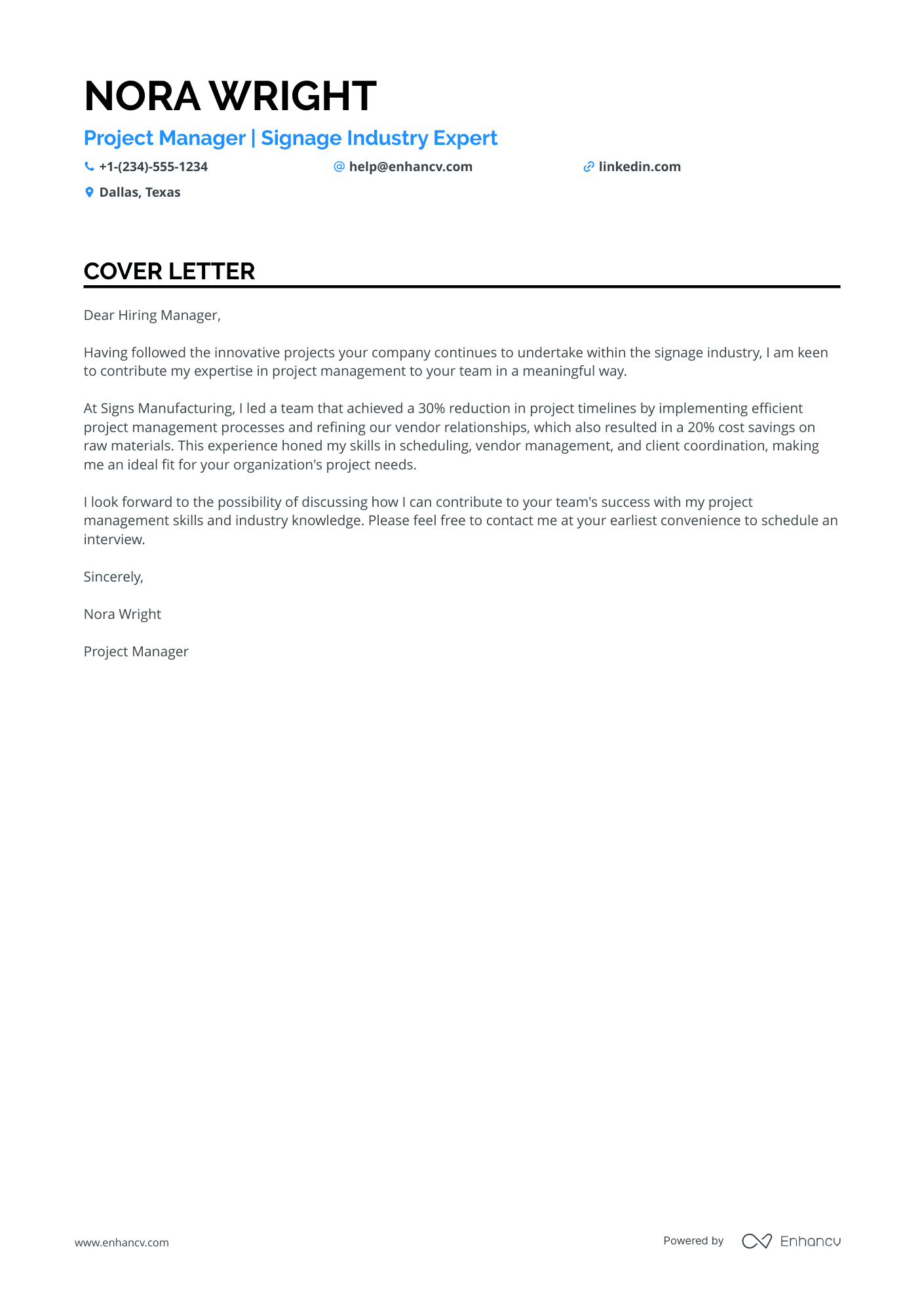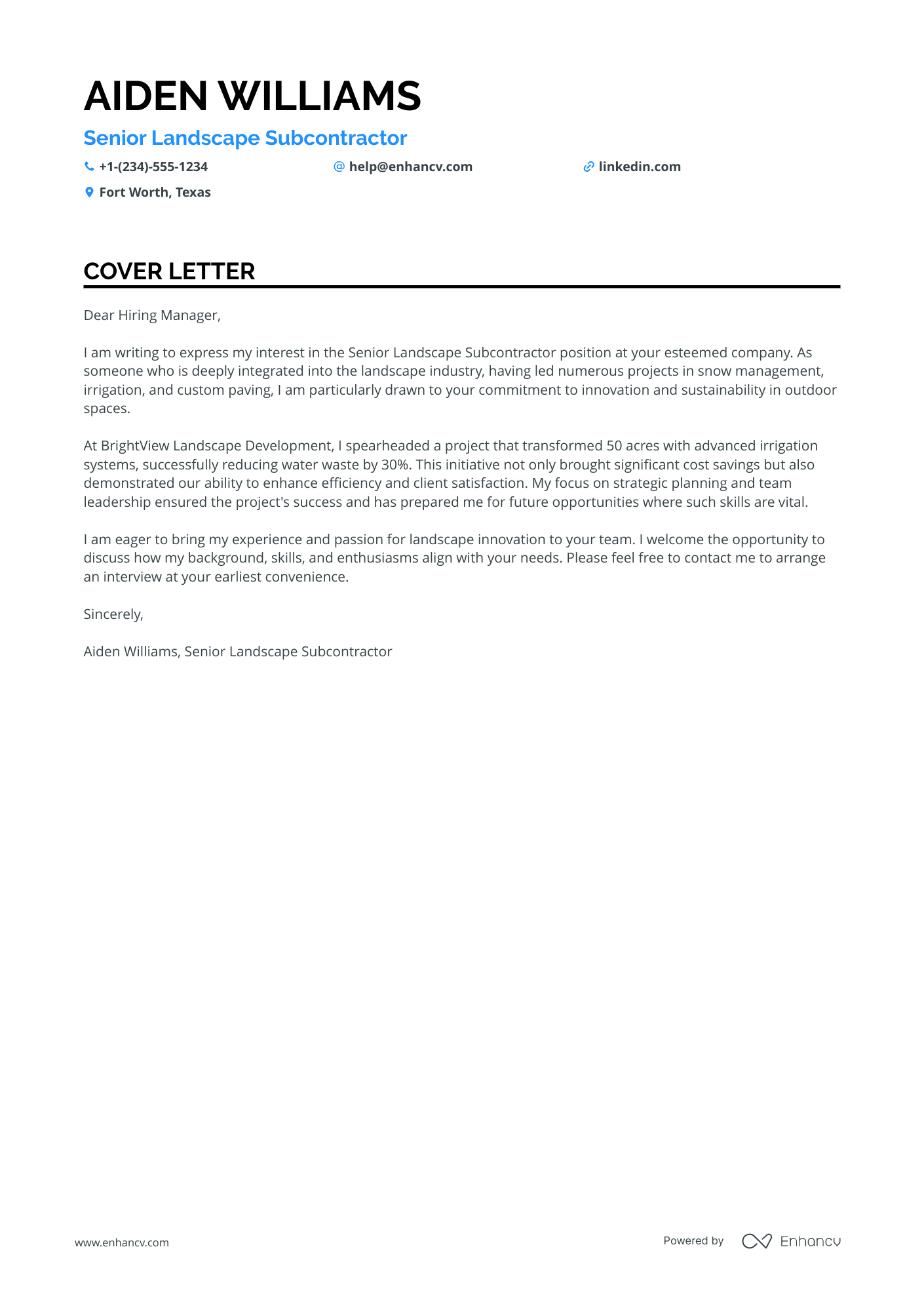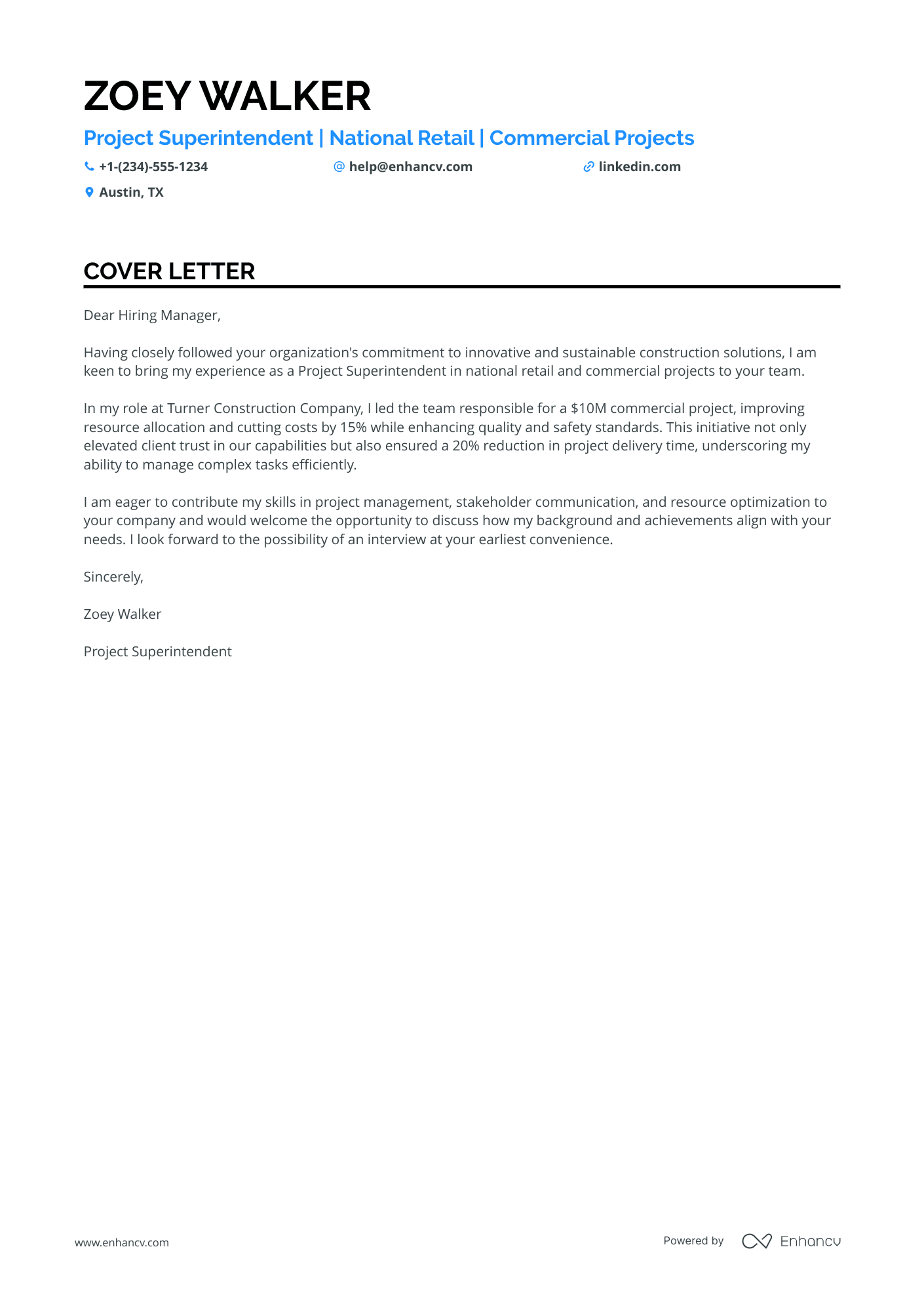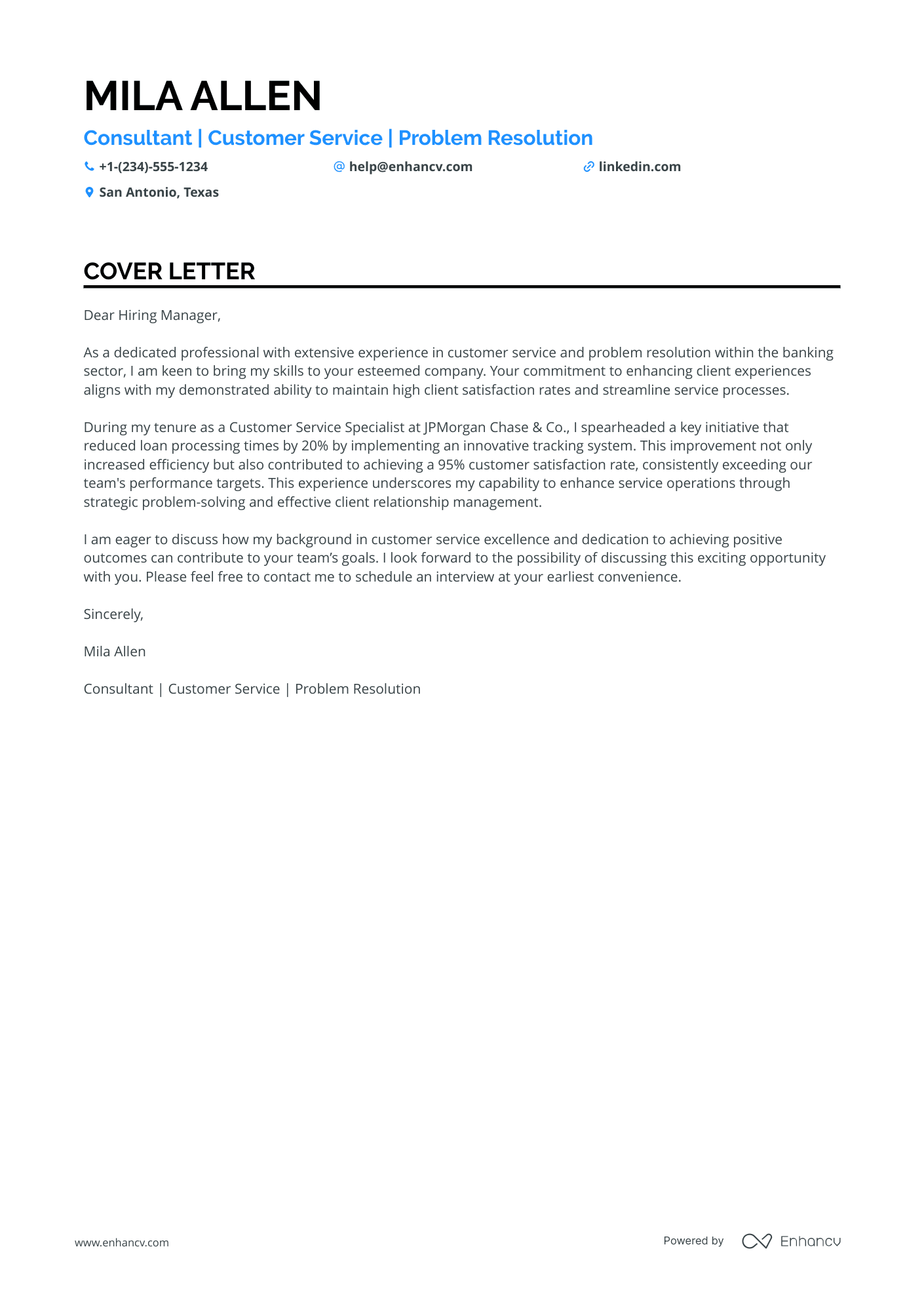Embarking on your job hunt, you’ve diligently crafted your resume, only to realize that a standout contractor cover letter is also in demand. This pivotal document shouldn't echo your resume but rather spotlight your proudest professional triumph, weaving it into a compelling narrative. Striking the perfect balance between formality and originality, without giving in to overused clichés, is key. And remember, brevity reigns supreme—your impactful story must unfold in just one page. Let’s explore how to master this.
- Create a contractor cover letter to persuade the recruiters you're the best candidate for the role;
- Use industry-leading contractor cover letter templates and examples to save time;
- Dedicate your contractor cover letter space to your best achievement;
- Make sure your contractor cover letter meets recruiters' expectations and standards.
Avoid starting at the blank page for hours by using Enhancv's AI - just upload your resume and your contractor cover letter will be ready for you to (tweak and) submit for your dream job.
If the contractor isn't exactly the one you're looking for we have a plethora of cover letter examples for jobs like this one:
- Contractor resume guide and example
- Field Manager cover letter example
- Structural Welder cover letter example
- Welder Fabricator cover letter example
- Plant Manager cover letter example
- Factory Manager cover letter example
- Production Manager cover letter example
- Field Service Manager cover letter example
- Automotive Technician cover letter example
- Parts Manager cover letter example
- Machine Operator cover letter example
Drop your resume here or choose a file.
PDF & DOCX only. Max 2MB file size.
Contractor cover letter example
VANESSA FORD
Arlington, VA
+1-(234)-555-1234
help@enhancv.com
- Relevance to Company Values: The cover letter successfully aligns the candidate's professional expertise with the company's commitment to sustainable building practices, suggesting a well-matched synergy between the applicant's skills and the organization's mission.
- Quantifiable Achievements: It highlights a specific career achievement that demonstrates the applicant's capability, showing how her work significantly cut annual energy costs in a past project, which serves as a powerful indicator of her potential value to the company.
- Leadership and Management Skills: By detailing a past leadership role in a major HVAC redesign project, the cover letter showcases the candidate's project management abilities and her experience in leading teams to achieve energy efficiency goals.
- Direct Call to Action: The closing paragraph invites the hiring manager to consider the candidate for an interview, illustrating the applicant's eagerness to engage in further discussions about her fit for the HVAC Contracting role.
Standard formatting for your contractor cover letter
Structure your contractor cover letter, following industry-leading advice, to include:
- Header - with your name, the role you're applying for, the date, and contact details;
- Greeting - make sure it's personalized to the organization;
- Introduction paragraph - no more than two sentences;
- Body paragraph - answering why you're the best candidate for the role;
- Closing paragraph - ending with a promise or a call to action;
- Signature - now that's optional.
Set up your contractor cover letter for success with our templates that are all single-spaced and have a one-inch margin all around.
Use the same font for your contractor cover as the one in your resume(remember to select a modern, Applicant Tracker System or ATS favorites, like Raleway, Volkhov, or Chivo instead of the worn-out Times New Roman).
Speaking of the ATS, did you know that it doesn't scan or assess your cover letter? This document is solely for the recruiters.
Our builder allows you to export your contractor cover letter in the best format out there: that is, PDF (this format keeps your information intact).
Need a cover letter, but short on time? Use our free cover letter generator to create one from your resume in no time.
The top sections on a contractor cover letter
- Header: The header includes your contact information, date, and the employer’s details, essential for establishing a professional layout and making it easy for the recruiter to reach out to you.
- Introduction: Start with a concise introduction that captures the recruiter's interest by stating your profession as a contractor, the position you're applying for, and a compelling reason why you're interested in the role.
- Experience Highlights: Detail your relevant contracting experience, mentioning specific projects or accomplishments that showcase your skills, reliability, and expertise in managing construction or renovation projects.
- Core Competencies: This section should identify your key skills, such as project management, budgeting, subcontractor coordination, and safety compliance, which are particularly valuable for a contractor role.
- Closing and Call to Action: Conclude with a proactive statement expressing your desire for an interview or meeting to discuss how you can contribute to the company's projects, showing your enthusiasm and initiative.
Key qualities recruiters search for in a candidate’s cover letter
- Proven track record of successful project completions: Recruiters look for contractors who can demonstrate a history of completing projects on time and within budget, which assures them of the candidate's ability to deliver results.
- Strong project management skills: Effective organization, planning, and execution are crucial for a contractor to manage different aspects of construction projects, ensuring that everything runs smoothly and efficiently.
- Relevant trade certification or license: Having the appropriate certification or license for the specific trade or contracting work shows professional credibility and adherence to industry standards, which is essential for legal and quality assurance purposes.
- Experience with safety compliance and regulations: Knowledge and implementation of construction safety standards protect workers and help prevent accidents, which is vital for maintaining a safe job site and minimizing liability.
- Excellent communication and interpersonal skills: Being able to communicate effectively with clients, architects, suppliers, and subcontractors is important for coordinating efforts and resolving issues that may arise during the course of a project.
- Financial acumen and budgeting experience: Contractors must be skilled at managing budgets, estimating costs, and controlling expenses to ensure the profitability of their projects while also meeting clients' financial constraints.
Greeting recruiters with your contractor cover letter salutation
What better way to start your conversation with the hiring manager, than by greeting them?
Take the time to find out who the professional, recruiting for the role, is.
Search on LinkedIn, the company website. And for those still keen on making a fantastic first impression, you could even contact the organization, asking for the recruiter's name and more details about the job.
Address recruiters in the contractor greeting by either their first name or last name. (e.g. "Dear Anthony" or "Dear Ms. Smarts").
If you're unable to discover the recruiter's name - don't go for the impersonal "To whom it may concern", but instead use "Dear HR team".
List of salutations you can use
- Dear Hiring Manager,
- Dear [Company Name] Team,
- Dear [Project Manager's Name],
- Dear [Department Name] Director,
- Dear [Mr./Ms. Last Name],
- Dear [Professional Title] [Last Name],
What to include in those first two sentences, or your contractor cover letter introduction
Have you ever wondered what the best way is to present your profile in the contractor cover letter introduction?
There's no right or wrong answer if you're being concise and authentic to yourself.
Some professionals start their contractor cover letter by:
- congratulating the company - focusing on something impressive, whether that's an award, an industry-leading project, or a key event;
- aligning their passion for the field or industry with the job - if you're enthusiastic about what you do, you'd thus grow your skill set and value as a professional.
How to select your best achievement for the middle, or the contractor cover letter body
You probably feel exhausted by this point in your application: you've dived into all the details of your success and skills in your contractor resume.
What else can you include in your contractor cover letter body?
Well, for starters, the next three to six paragraphs should show you further value as a professional. Or, why should recruiters choose you?
Think back on a noteworthy achievement that answers key job requirements and dive deep.
Structure your contractor cover letter middle as you'd a story: following chronological logic and highlighting outcomes, thanks to skills.
At the end of the day, you'd want recruiters to be able to see you as the best candidate for the role and understand more about who you are and what makes your success unique (and valuable to the role).
A sincere and original way to end your contractor cover letter
When writing their contractor cover letter, candidates tend to use one of these phrases, "Sincerely yours" or "I look forward to hearing from you".
Both statements show good manners, but your cover letter should end in a more actionable manner.
Write about:
- how you see yourself growing in the role/organization;
- the benefits you would bring about (you'd impress even more with tangible metrics);
- the next steps in the process (provide your availability for interviews).
Lacking experience: here's how to write your contractor cover letter
As a candidate with no experience, it's important to be honest from the get-go of your application.
Use your contractor cover letter to sell your unique talents. Choose an accomplishment from your academic background or your volunteer work to show the skills that are relevant to the role.
Focus on your career objectives and how you see the job to align with them. Be specific and, at the same time, realistic about where you picture yourself in five years.
Key takeaways
Your contractor cover letter is your best shot at standing out by showing your motivation and the unique skills you'd bring to the job:
- Chose no more than one achievement, which you'd be talking about in the body of your contractor cover letter, by focusing on skills and outcomes;
- Address recruiters with their first or last name, or "Dear Hiring Manager" in your contractor cover letter greeting;
- Introduce in no more than two sentences what makes your profile unique (perhaps it's your motivation, enthusiasm, or appreciation of the company you're applying for);
- Select the same font you have used in your resume (avoid Times New Roman and Arial, as most candidates tend to invest in them);
- Close your contractor cover letter with a promise of how you see yourself growing in the company and the benefits you'd bring about.
Contractor cover letter examples
By Role
Project Management Contractor
- Industry-Specific Achievements: The cover letter highlights a significant reduction in project timelines and cost savings achieved at a previous company, demonstrating relevant industry experience and a successful track record.
- Contribution-Oriented Language: The candidate expresses a clear willingness to contribute their skills and knowledge to the prospective employer’s projects, aligning personal goals with the company’s objectives.
- Quantifiable Success: Utilizing data-driven achievements, such as a 30% reduction in timelines and 20% cost savings, provides concrete evidence of the candidate's effectiveness and impact in previous roles.
- Specific Role Relevance: The mention of skills in scheduling, vendor management, and client coordination directly relates to typical responsibilities of a project manager in the signage industry, emphasizing the candidate's suitability for the role.
Subcontractor
- Highlighting a Successful Project: The cover letter details a specific project at BrightView Landscape Development where the candidate reduced water waste by 30% through advanced irrigation systems, showcasing the ability to deliver measurable improvements.
- Emphasizing Leadership and Strategic Planning: The candidate underscores their leadership skills and strategic planning capabilities, which were pivotal in the project's success, indicating their readiness to take on senior roles.
- Alignment with Company Values: By expressing interest in the company's commitment to innovation and sustainability, the candidate aligns their career aspirations with the values of the hiring company.
- Strong Closing Statement: The letter includes an assertive closing that expresses eagerness to contribute to the team, indicating the candidate’s proactive approach and enthusiasm.
General Contractor
- Highlighting specific project successes, such as managing a $10M commercial project and achieving significant cost reductions, which demonstrates real-world experience in a role focused on large-scale project management.
- Emphasizing results-oriented achievements, like a 20% reduction in project delivery time, showcasing an ability to enhance efficiency—an essential skill for a Project Superintendent.
- Focusing on relevant skills such as resource allocation, stakeholder communication, and quality and safety standards, which address core competencies crucial for the role.
- Expressing alignment with the company's mission or values (innovation and sustainability in construction), which indicates genuine interest and a cultural fit with the organization.
Independent Contractor
- Highlighting Relevant Industry Experience: The cover letter effectively begins by pointing out the applicant's extensive experience specifically within the banking sector, which is crucial for establishing credibility and relevance for the customer service role.
- Quantifying Achievements: By mentioning a specific initiative that reduced loan processing times by 20% and increased customer satisfaction to 95%, the letter uses quantifiable metrics to emphasize the applicant’s impact and effectiveness, which can be a persuasive technique to demonstrate tangible contributions.
- Aligning Personal and Company Goals: The candidate aligns their strengths and achievements with the company’s goals of enhancing client experiences, showing that they have researched the organization and are motivated to contribute positively to its objectives.













